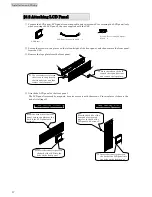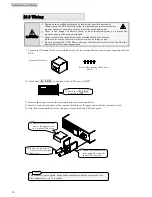
Safety Precautions
5
6. Radio Frequency Interference
CAUTION
This equipment has been tested and found to comply with the limits for a Class A digital device, pursuant to part 15 of the
FCC Rules. These limits are designed to provide reasonable protection against harmful interference when the equipment is
operated in a commercial environment. This equipment generates, uses, and can radiate radio frequency energy and if not
installed and used in accordance with the instruction manual, may cause harmful interference to radio communications.
Operation of this equipment in the residential area is likely to cause harmful interference in which case the user will be
required to correct the interference at his own expense.
7. Battery Handling Precautions
CAUTION
Battery servicing should be performed by technically qualified personnel. Keep unqualified personnel away from
batteries.
Replace batteries only with the same model and brand as the ones used for this UPS. Risk of explosion if battery is
replaced by an incorrect type.
The batteries in this product are lead type batteries which are a reusable resource. Please cooperate by recycling when
replacing or disposing of used batteries. Dispose of used batteries according to the instructions. Customers should not
dispose of used batteries themselves. To dispose of used batteries, contact your nearest sales representative, an
authorized industrial waste handling company, or repack them in their original cartons and send them to your
supplier or SANYO DENKI.
Do not use batteries after their service life has expired. Doing so may result in fuming or fire. Additionally, the battery
backup function may fail to operate with such batteries, so that power will not be supplied to the load when a power
outage occurs.
Batteries pose hazards for electrical shock and dangerous short-circuit current. The following precautions
should be observed when working with batteries.
a. Remove watches, rings and other metal objects.
b. Use insulated tools.
c. Wear rubber gloves and boots.
d. Do not lay tools or metal parts on top of batteries.
e. Disconnect the charging source prior to connecting or disconnecting battery terminals.
f. Determine whether the batteries have been inadvertently grounded, and if so, remove the source of grounding.
Contact with any part of a grounded battery can result in electric shock.
Do not attempt to open or disassemble batteries. The electrolyte is harmful to the skin and eyes. The battery contains
diluted sulfuric acid, which is extremely toxic. If a battery leaks, take appropriate measures to prevent any battery
fluid contacting your skin or clothing. Diluted sulfuric acid may cause blindness if it gets into the eye, may burn skin
upon contact. It is electrically conductive and corrosive. Observe the following procedures if electrolyte spills:
a. Wear full eye protection and protective clothing.
b. If sulfuric acid contacts the skin, wash it off immediately with water.
c. If sulfuric acid contacts the eyes, flush thoroughly and immediately with water, and seek medical attention.
d. Spilled sulfuric acid should be washed down with a suitable acid-neutralizing agent, such as a solution of
approximately one pound (500 grams) of bicarbonate of soda in one gallon (4 liters) of water. The bicarbonate of
soda solution should be applied until evidence of reaction (foaming) has ceased. The resulting liquid should be
flushed with water and the area dried.
Lead-acid batteries may present the risk of fire due to the generation of hydrogen gas. The following precautions
should be observed.
a. DO NOT SMOKE near batteries.
b. DO NOT allow flames or sparks near batteries.
c. Before working with batteries, discharge static electricity from the body by first touching a grounded metal
surface before touching the batteries.
If a fire occurs near a battery, do not use water to extinguish it. Use only a powder-extinguishing agent (ABC). Using
water may cause the fire to spread.
Do not dispose of batteries in fire, as they may explode.
Strictly observe the following precautions when handling the batteries. Failure to do so may cause battery leakage,
overheating or explosion.
a. Do not solder to any part of a battery directly.
b. Do not charge the batteries with reversed positive (+) and negative (-) terminal polarity.
c. Do not mix different battery types, brands or versions.
d. Do not attempt to peel off or break the outer covering of a battery.
e. Do not subject batteries to strong physical shock, or throw them away.
f. Clean batteries with water-moistened cloth squeezed hard. Do not use organic solutions such as gasoline,
thinner or benzene or detergent.
g. Electrical energy may remain in a battery even after its service life has expired. Do not allow sparks near used
batteries, and protect them from short-circuiting.
!
!
!
Содержание SANUPS A11J
Страница 1: ...M0009237 5 kVA Instruction Manual ...
Страница 25: ...Installation and Wiring 22 Blank page ...
Страница 41: ...Troubleshooting 38 Blank page ...
Страница 50: ...Blank page ...
Страница 51: ...Blank page ...
Страница 52: ......









































